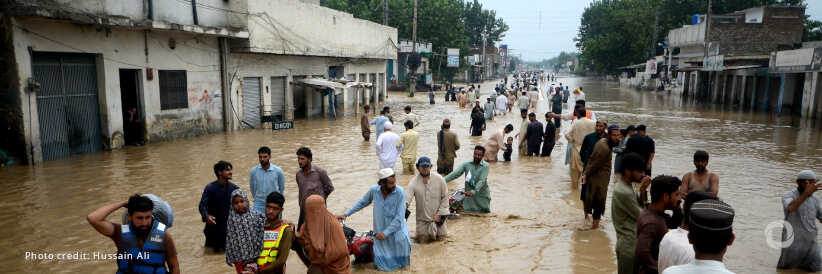It has been over 2 months since the worst floods in decades swept Pakistan, but families continue to suffer as they endure the devastating consequences. Over 2.2 million people have lost their homes and are now living under the open sky with no sources of food or water. Over 1,700 people have lost their lives with nearly 12,900 others injured in the disaster.
Recent estimates indicate that over 2,000 health facilities have been affected by the heavy rains and floods. Access to health facilities, healthcare workers, and essential medicines and medical supplies is said to remain limited. Equally, as concerning are reports that tens of thousands of people are affected by diarrhoea, malaria, acute respiratory infections, skin and eye infections and typhoid.
Beyond the immediate and destructive impact of the floods, many people have found their livelihoods left in ruins. More than 4.4 million acres of crops and orchards have been affected, while over 1.1 million livestock animals have died in the floods.
Essential infrastructure has also been heavily affected, with the knock-on consequences making it difficult for humanitarian organisations to reach affected areas. More than 13,000 kilometres of roads have been damaged with 400 bridges destroyed. The total cost of the damage so far is expected to be over $10 billion.
Islamic Relief’s ongoing support
Islamic Relief has been working tirelessly, providing emergency relief to those in need since August 3. Islamic Relief was able to provide food packs, kitchen sets, hygiene kits and tents to over 91,550 individuals in heavily affected areas like Noshki, Quetta and Balochistan during the initial emergency relief stage.
Since the floods began, we have been operating in areas such as Malir-Karachi, Thatta, Dadu, Mirpur Khas and Sindh, providing over 200,000 individuals with food packs, household kits and tarpaulin sheets.
In times of disaster, working in collaboration with partner organisations is vital to providing the level of support needed. Islamic Relief has been working with Shelter Box to provide kits to families in Sindh – these kits include family tents and solar lights among other essential items that are important in instances of disaster.
Working with UNICEF, Islamic Relief has provided over 1,000,000 litres of drinking water so far. IRW will continue to provide 20,000 litres of drinking water on a daily basis in the flood-affected areas of Dadu and Qamber Shahdadkot in Sindh and DI Khan, Nowshera and Charsadda in Khyber Pakhtunkhwa.
Islamic Relief has also been providing uprooted families with temporary latrines and wash stations, and will soon be providing dewatering pumps that will help resolve issues such as standing water and crop damage.
Islamic Relief has reached over 554,650 people so far and has already moved to assist communities to recover from the disaster.
The road to recovery
Millions of people have lost their homes and are now facing dire conditions in temporary shelters. To assist, Islamic Relief will be providing 4,600 permanent shelters in the worst affected areas of Balochistan, Sindh and Khyber Pakhtunkhwa, giving families a roof over their heads as they begin rebuilding their lives.
Waterborne diseases have been on the rise in the aftermath of the flood. In response, Islamic Relief is conducting water, sanitation and hygiene interventions providing food items, kitchen sets, and other essentials such as temporary shelters. Psychosocial sessions are also being provided for those suffering due to the losses they have suffered. Pit latrines have been constructed and hygiene kits were given to people who have lost their homes.
The organization also builds temporary learning centres to ensure children don’t miss out on their education. The scale of the damage in Pakistan continues to astound and alarm and conditions are likely to deteriorate as winter approaches.

